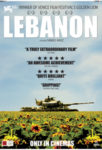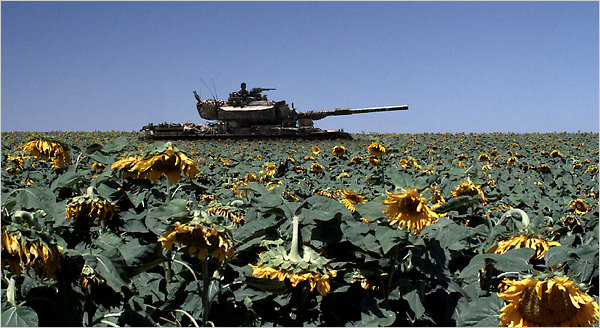 The 1982 Israeli invasion of Lebanon, ostensibly in search of Palestinian guerillas, is known by many names. Commonly referred to as the Lebanon War, Israel’s then Prime Minister Begin called it “Operation Peace for Galilee”. In Arabic, it is simply referred to as Al-ijtiyāḥ or “the invasion”. Regardless of what it is called, it was a seminal point in Israeli-Arabic relations in the second half of the 20th century, and has been returned to in film and literature many times in the last three decades. Most notable is the Academy Award nominated animated feature Waltz with Bashir, a harrowing but beautifully presented look at the horrors of war. Director Samuel Maoz returns to the subject with Lebanon, partly based on his own experiences as a young soldier in the Israeli army.
The 1982 Israeli invasion of Lebanon, ostensibly in search of Palestinian guerillas, is known by many names. Commonly referred to as the Lebanon War, Israel’s then Prime Minister Begin called it “Operation Peace for Galilee”. In Arabic, it is simply referred to as Al-ijtiyāḥ or “the invasion”. Regardless of what it is called, it was a seminal point in Israeli-Arabic relations in the second half of the 20th century, and has been returned to in film and literature many times in the last three decades. Most notable is the Academy Award nominated animated feature Waltz with Bashir, a harrowing but beautifully presented look at the horrors of war. Director Samuel Maoz returns to the subject with Lebanon, partly based on his own experiences as a young soldier in the Israeli army.
It is June, 1982 and a single tank is instructed to make its way to the middle of a field. The occupants are told that they will be embarking on a mission to search a hostile town in Lebanon, accompanied by a collection of paratroopers. The unruly group of tank operators threaten the operation when the gunner becomes mildly crippled with anxiety, and one of the other soldiers has chosen this mission to wave his insubordinate flag at his increasingly unsure commander. As the vague target grows closer, the tank occupants become increasingly aware that things are not going to plan and they are quite literally being kept in the dark.
Lebanon immediately marks itself as something very different to previous war films by largely playing out in a first-person point of view as seen down the scope of the tank’s gun. Indeed, with the exception of the opening and closing shots – a beautifully photographed field of tall semi-wilted sunflowers, the latter one punctuated by the tank seen externally for the first time – we spend the duration of the film inside the belly of the beast. In this sense, the action is somewhat ‘stagey’: characters visit the ‘set’ rather than our leads going out to meet their foes head-on. Almost every shot of the outside world is through the magnification of the gun sight, magnified or simply distorted by the night vision. This keeps us at arm’s length from “reality”, allowing us to casually observe some particularly gruesome scenes with documentary distance. Yet it also gives a sense of intense and intimate claustrophobia to everything that is happening inside the tank. All of our senses are eventually in tuned with those in the tank, as we slowly have each one taken away from us and mechanically replaced. The grinding and whirring of hydraulic gears and electronics of the scope with every shift of the scope puts us inside the machine and fills our every sense. Once the audience is inside the tank, there is no way out.
Criticised by anti-Israeli protesters, the film is clearly a musing against war in country where military service has been a generational occupation. It won the Leone d’Oro at the 66th Venice International Film Festival in recognition of this clear stance against war by someone who had lived through this dark period in an already tumultuous history. Upon accepting this award, Maoz commented: “I dedicate this award to the thousands of people all over the world who, like me, come back from war safe and sound. Apparently they are fine, they work, get married, have children. But inside the memory will remain stabbed in their soul.” One could definitely be forgiven for thinking that this is taking sides, with political partiality leaning towards the Israeli side of wall, and comparisons with the superior and more inclusive Waltz with Bashir. However, there is a universal theme to young men and the futility of war that has just as much in common with Terrence Malick’s Thin Red Line or Peter Weir’s Gallipoli as it does with the Oscar-nominated animation.
Lebanon is a powerful reminder of the horrors of conflict. Some have commented that the Lebanon War is like Israel’s Vietnam, as it was the first Israeli war that was not considered to be a “just” war necessary for the survival of the nation. It has certainly been a rich source of material for the fledgling film industry, which along with Bashir has also included Beaufort. Film has the power to change ideas, although some would argue that a few well-crafted pictures may not be quite enough to overcome thousands of years of combat for independence. To give this another perspective, after 9 years and thousands of deaths, Afghanistan is still a country being invaded as part of Operation Enduring Freedom. It doesn’t sound all that far removed from Operation Peace for Galilee, does it?
Lebanon is released in Australia on December 2 from Rialto Distribution. It will be released on DVD 11 April 2011 in Australia.
DVD Bits can be found at http://www.dvdbits.com. Join the conversation on Twitter @DVDBits.





No Responses